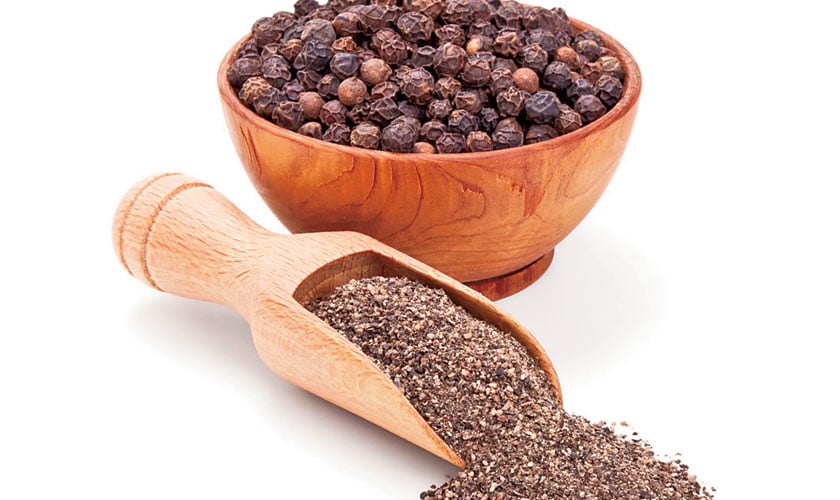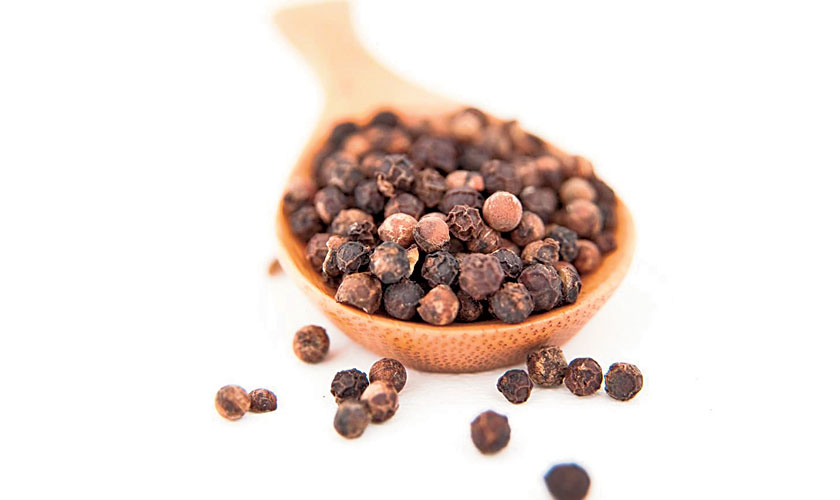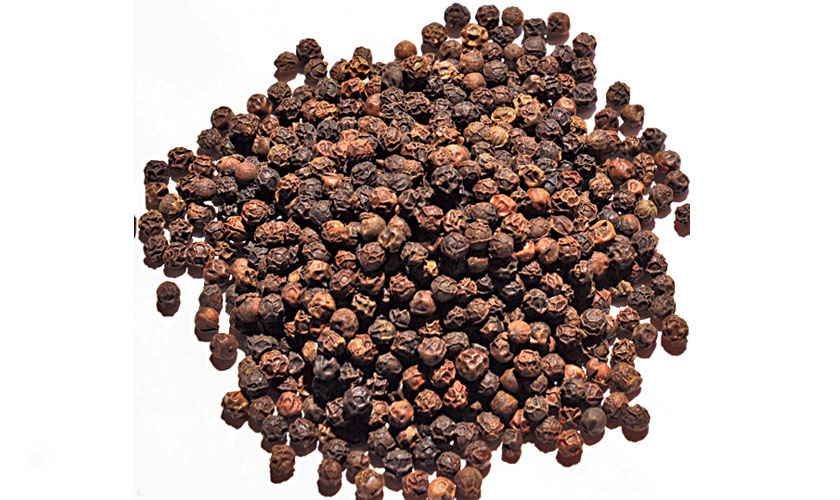We use it to spice up our food and add flavour but there is so much more to black pepper than just flavour. You! takes a look at some amazing health benefits of this humble spice...
health
We use it to spice up our food and add flavour but there is so much more to black pepper than just flavour. You! takes a look at some amazing health benefits of this humble spice...
Often referred to as the ‘king of spice’ pepper accounts for a quarter of the world’s spice production and has been highly revered since ancient times both for its trade value and medicinal attributes.

Black pepper does a whole lot more than hang around with salt. Black pepper comes from the pepper plant, a smooth woody vine that can grow up to 33 feet in hot and humid tropical climates. They begin to bear small white clustered flowers after 3 to 4 years and develop into berries known as peppercorns. Ground peppercorns produce the spice we call pepper. It has an active component called piperine that gives black pepper its characteristic taste. Plus, it contains iron, potassium, calcium, magnesium, manganese, zinc, chromium, vitamins A and C, and other nutrients. Black pepper (scientific name: Piper nigrum) is a hot, pungent spice with a host of health benefits.
The black history:
Native to India, pepper has played a very important role throughout history and has been a prized spice since ancient times. Since ancient Greece, pepper was used to both honor the gods and to pay taxes and ransoms. During the fall of ancient Rome, the invading barbarians were even honored by being given black pepper. Additionally, in the Middle Ages the wealth of a man was oftentimes measured by his stockpile of pepper.

The reason that pepper was so cherished is that it served important culinary purposes. Not only could its pungency spice up otherwise bland foods, but it could disguise a food’s lack of freshness, the latter being an especially important quality in the times before efficient means of preservation.
Pepper became an important spice that catalyzed much of the spice trade. This not only led to exploration of many undiscovered lands, but also to the development of major merchant cities in Europe and the Middle East.
Culinary uses:
Available throughout the year, black pepper is one of the most versatile spices used in several kinds of savoury cooking. In order to keep their fragrance and flavor intact, they generally milled just before preparing dishes and added at the last minutes in the recipes (since prolonged cooking results in evaporation of essential oils).
The spice is used liberally in Pakistani and Indian vegetarian and chicken curries and in the Middle-East, in meat and rice dishes. They can be employed in the preparation of soups, barbecue sauces, pickling and as a main ingredient in variety of curry powders.
Although preferred in savoury foods, this spice can also feature, albeit, in tiny quantities in sweet preparations like fruitcakes, breads, pies to add a peppery-spice note.
In India and Pakistan, black peppercorn powder mixed with salt, and the mixture is a common item found on the serving table in restaurants. The mixture is sprinkled over vegetable/fruit salads, chats, lemonades, in soups, etc. Black pepper can be added to fresh vegetable juices and to most cooked and raw foods.

Black pepper health benefits:
Increases nutrient absorption: The piperine in black pepper enhances the bioavailability of various nutrients such as vitamins A and C, selenium, beta-carotene, and others, thereby improving your overall health. Bioavailability refers to the amount of a nutrient or supplement that is absorbed by the body. For example, researchers have found that it can increase the bioavailability of the compound curcumin (found in turmeric) twentyfold. Curcumin helps fight cancer, infection, and inflammation.
Promotes digestion: The piperine content of black pepper makes it a great digestive. It stimulates the taste buds to signal the stomach to produce more acid. Stomach acid is essential for digestion as it helps breakdown foods and the acidity triggers the release of digestive enzymes that help complete the digestive process. Inadequate acid levels (which are more common than we think) are a major contributor to flatulence, indigestion, IBS, diarrhea, constipation and heartburn.
Stimulates appetite: Besides adding flavour to your food and promoting digestion, black pepper works as an appetite stimulant. Research has shown that black pepper helps improve the appetite through olfactory stimulation. This makes it an excellent, simple remedy for those with a poor appetite.
Facilitates weight loss: Although it stimulates the appetite, black pepper also can help you lose weight. The outer layer of peppercorns contains phytonutrients that encourage the breakdown of fat cells. In addition, being a diuretic and diaphoretic herb, it promotes urination and perspiration, which in turn help flush toxins and excess water from the body.
Relieves gas: Known for its carminative properties black pepper is great to relieve discomfort caused due to flatulence and colicky pain. Adding pepper to your meals instead of chili powder will help relieve flatulence.
Relieve cough & cold: Black pepper is antibacterial in nature, and therefore helps to cure cold and cough. A teaspoon of honey with freshly crushed pepper does the trick. It also helps to alleviate chest congestion, often caused due to pollution, flu, or a viral infection. You can add it to hot water and eucalyptus oil and take steam. And given that black pepper is rich in Vitamin C, it also works as a good antibiotic.
Combats arthritis: The piperine present in black pepper is highly beneficial for treating arthritis due to its anti-inflammatory and anti-arthritic properties. In addition, this wonderful spice improves circulation, thereby preventing or reducing joint pain caused by poor circulation.
Improves your skin: Apart from helping you sweating and releasing all the toxins from your skin, it acts a great exfoliant. Pepper when crushed and added to a face scrub, helps slough off dead skin, stimulates circulation and helps deliver more oxygen and nutrients to the skin.
Addresses depression: The Journal of Food and Chemical Toxicology reported that the compound piperine in black pepper increases the cognitive function of the brain and helps beat depression. Add it to your daily meal, or eat it as seasoning on a salad. Pepper in any form can help make you smarter and less depressed.
So, the next time you want to spice up your meal, use pepper. It will not only add to the flavour, it has the potential to make you happier!